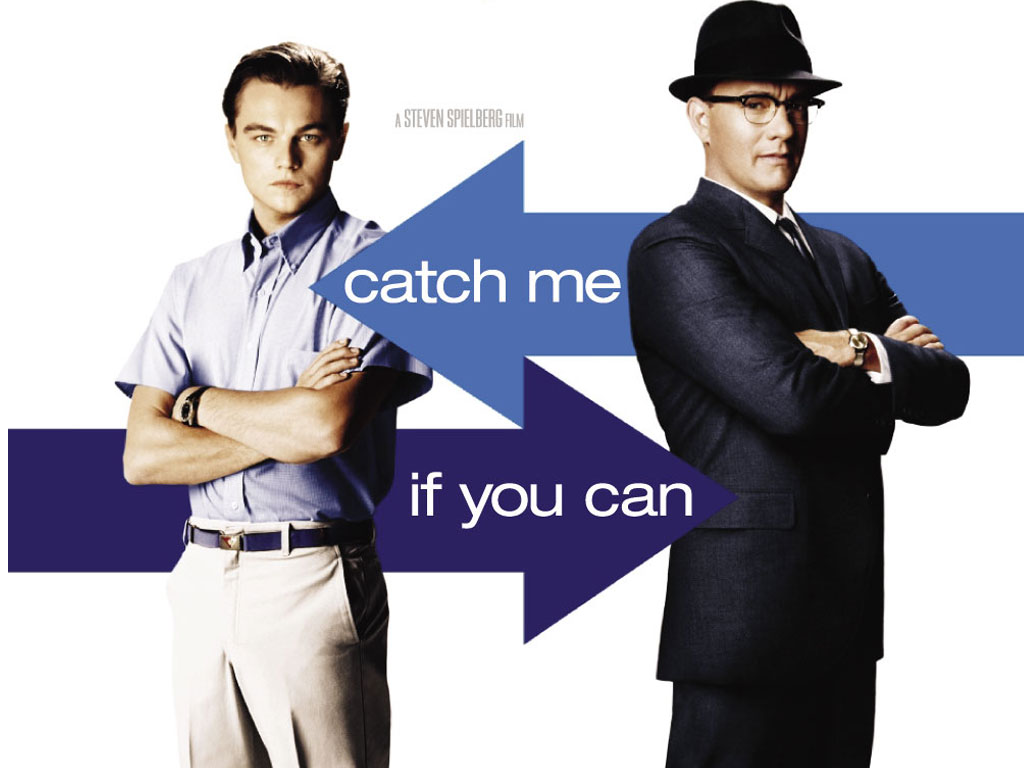Catch Me If You Can, Steven Spielberg 2002
Catch Me If You Can, Steven Spielberg (2002)
Catch Me If You Can is a true story of Frank Abagnale Jr. who, before his 19th birthday, successfully conned millions of dollars worth of check as a pilot, doctor, professor and a legal prosecutor.
Catch me if you can was written by Jeff Nathanson, it was adapted by Frank Abagnale Jr. in 1980 who wrote a biography of him self. Catch Me if you Can was directed by Steven Spielberg. Steven Spielberg was born December 18, 1946, In his career that has spanned for more than four decades. Spielberg's early sciences-fiction and adventure films, such as Jaws (1975) , Indiana Jones and Raiders of the Lost Ark (1981) and ET (1982). These films are some the highest rated films of all time, all together winning 10 Oscars 2 Golden Globes and 3 BAFTAs. Steven has also directed and produced plenty of of war films such as 1941 (1979), Empire of the the Sun (1987), Schindler's List (1993), saving Private Ryan (1998), War Horse (2011) and Bridge of Spies (2015).

The Protagonist of Catch Me if You Can is Frank Abagnale Jr (Leonardo DiCaprio) the antagonist is Carl Hanratty (Tom Hanks). throughout the film, the lighting of the scenes, along with the music tonality and sound effects change depending on the mood the director wishes the audience to feel. In the first prison scene, we see Carl visiting Frank in a French prison to bail him out. The details of the two’s relationship has not been revealed yet, but one can gather than Carl is an FBI agent that must have been pursuing Frank for something that goes back further than the present state he is in with the Foreign affairs from the United States. Frank’s authoritative tone and conversation with the French officials reveals some of the setting that the viewer is dropped off in. The high key lighting and cool color tones of the prison is also coupled by a leaky ceiling with dripping water effects, letting the viewer know this is not a safe and savvy quarters. Frank is heard coughing from behind the prison cell, and his conversation with Carl reiterates him being restricted by the camera shot through the bars. We witness Frank’s first con when they bring him to the hospital and he soon disappears from the bed table after pretending to be unconscious.
Father and son themes occur when as soon as his parents file for a divorce, Frank begins a life of running and conning in a pursuit of seeking union and family once again. He offers his father money and nice things in hopes of winning his mother back, but his pursuits are useless as well as the deeper hole he digs for himself with the government over fraud. The editing strategies on montage across time show the viewer the process of Frank learning how to be a con artist- from becoming an airline pilot, a Doctor, a Lawyer, and leading a poor girl’s heart on to marriage.
Catch me if you can was written by Jeff Nathanson, it was adapted by Frank Abagnale Jr. in 1980 who wrote a biography of him self. Catch Me if you Can was directed by Steven Spielberg. Steven Spielberg was born December 18, 1946, In his career that has spanned for more than four decades. Spielberg's early sciences-fiction and adventure films, such as Jaws (1975) , Indiana Jones and Raiders of the Lost Ark (1981) and ET (1982). These films are some the highest rated films of all time, all together winning 10 Oscars 2 Golden Globes and 3 BAFTAs. Steven has also directed and produced plenty of of war films such as 1941 (1979), Empire of the the Sun (1987), Schindler's List (1993), saving Private Ryan (1998), War Horse (2011) and Bridge of Spies (2015).

The Protagonist of Catch Me if You Can is Frank Abagnale Jr (Leonardo DiCaprio) the antagonist is Carl Hanratty (Tom Hanks). throughout the film, the lighting of the scenes, along with the music tonality and sound effects change depending on the mood the director wishes the audience to feel. In the first prison scene, we see Carl visiting Frank in a French prison to bail him out. The details of the two’s relationship has not been revealed yet, but one can gather than Carl is an FBI agent that must have been pursuing Frank for something that goes back further than the present state he is in with the Foreign affairs from the United States. Frank’s authoritative tone and conversation with the French officials reveals some of the setting that the viewer is dropped off in. The high key lighting and cool color tones of the prison is also coupled by a leaky ceiling with dripping water effects, letting the viewer know this is not a safe and savvy quarters. Frank is heard coughing from behind the prison cell, and his conversation with Carl reiterates him being restricted by the camera shot through the bars. We witness Frank’s first con when they bring him to the hospital and he soon disappears from the bed table after pretending to be unconscious.
Father and son themes occur when as soon as his parents file for a divorce, Frank begins a life of running and conning in a pursuit of seeking union and family once again. He offers his father money and nice things in hopes of winning his mother back, but his pursuits are useless as well as the deeper hole he digs for himself with the government over fraud. The editing strategies on montage across time show the viewer the process of Frank learning how to be a con artist- from becoming an airline pilot, a Doctor, a Lawyer, and leading a poor girl’s heart on to marriage.

Comments
Post a Comment